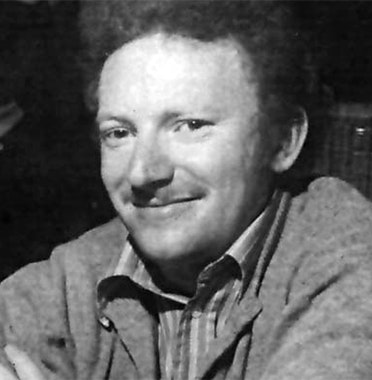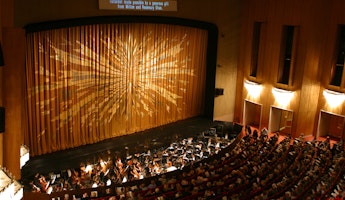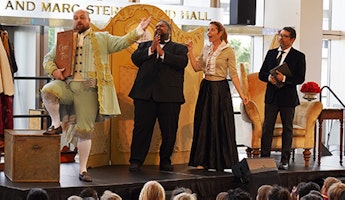
Roy Budd
Roy Budd (1947-1993) was a jazz pianist and composer who wrote the soundtrack scores for more than 50 films. He is best known for his score for the 1971 film Get Carter, starring Michael Caine. Perhaps his most ambitious project was one completed shortly before his death. He had loved the 1925 silent film The Phantom of the Opera since he was a child and had always dreamed of writing music for the iconic film. In 1993, he did just that, completing his monumental, romantic, anguished score. Just weeks before the composition’s scheduled premiere at the Barbican, he died from a brain hemorrhage at the tragically early age of 46, and the performance was cancelled. His widow, Sylvia, dedicated herself to making sure that the project would come to fruition, and the score was eventually first performed live in 2017 at the London Coliseum.
Roy Budd the musician was entirely self-taught and was hailed as a child prodigy. During his teens he developed a taste for jazz and formed the Roy Budd Trio, with bassist Pete Morgan and drummer Chris Karan. On leaving school at the age of 16, he embarked on a professional career as a jazz pianist.
In 1970, Budd made his debut in the world of film music, but this was achieved in rather unusual circumstances. Hearing that director Ralph Nelson was looking for an English composer for his controversial film Soldier Blue (1970), he was so keen to get the assignment, he put together a tape consisting of music composed by such greats as Jerry Goldsmith, John Williams, Max Steiner, Dimitri Tiomkin and Lalo Schifrin, and sent it off to Nelson, with the claim that it was all his own work. Shrewdly, he didn't pick any of these composer's main themes, in case of arousing the director's suspicion, and, not surprisingly he got the job. Apart from the main theme, which he based on Buffy Sainte-Marie's hit song of the same title, he composed all the music required for the film.
The acclaim with which his score for Soldier Blue was greeted led to many more opportunities in the genre, and the following year he was able to score another six films. The first of these, Flight of the Doves (1971), was, like Soldier Blue, directed by Ralph Nelson. Next up was the score for a film which has since become something of a cult. Written and directed by Mike Hodges, Get Carter (1971) starred Michael Caine, John Osborne and Ian Hendry in a violent story of a London-based racketeer aiming to avenge his brother's death at the hands of Northern gangsters. Budd's music admirably suited the mood of the film, particularly his main theme, which incorporated the sounds of Caine's train journey to Newcastle. The film's budget reputedly allowed only 450 pounds for the score, but he overcame this restriction by using only three musicians, including Budd himself playing electric piano and harpsichord simultaneously.
Budd's innovative method of using the film's sound effects to complement his music, continued with Zeppelin (1971), the story of an attempt by the British to steal the secrets behind the infamous German airship. On this occasion, Budd took advantage of the distinctive sound of the zeppelin's diesel-powered engine to introduce his own stirring main theme. When producer Euan Lloyd signed him to score the western Catlow (1971), it proved to be the start of an enduring relationship. Catlow was the first of six films he made with Lloyd, followed by Paper Tiger (1975), The Wild Geese (1978), The Sea Wolves (1980), The Final Option (1982) and Wild Geese II (1985).
During the 1970s, he also scored the films The Magnificent Seven Deadly Sins (1971), Something to Hide (1972), Fear Is the Key (1972), The Stone Killer (1973), The Destructors (1974), The Black Windmill (1974), and Sinbad and the Eye of the Tiger (1977).
Moving on to the eighties, his film work included the scores for Mama Dracula (1980) and Field of Honor (1986). Returning to his first love, he played regular jazz gigs in London and arranged for and accompanied such artists as Bob Hope, Tony Bennett, Charles Aznavour and Caterina Valente in concerts all around the world.
Roy Budd the musician was entirely self-taught and was hailed as a child prodigy. During his teens he developed a taste for jazz and formed the Roy Budd Trio, with bassist Pete Morgan and drummer Chris Karan. On leaving school at the age of 16, he embarked on a professional career as a jazz pianist.
In 1970, Budd made his debut in the world of film music, but this was achieved in rather unusual circumstances. Hearing that director Ralph Nelson was looking for an English composer for his controversial film Soldier Blue (1970), he was so keen to get the assignment, he put together a tape consisting of music composed by such greats as Jerry Goldsmith, John Williams, Max Steiner, Dimitri Tiomkin and Lalo Schifrin, and sent it off to Nelson, with the claim that it was all his own work. Shrewdly, he didn't pick any of these composer's main themes, in case of arousing the director's suspicion, and, not surprisingly he got the job. Apart from the main theme, which he based on Buffy Sainte-Marie's hit song of the same title, he composed all the music required for the film.
The acclaim with which his score for Soldier Blue was greeted led to many more opportunities in the genre, and the following year he was able to score another six films. The first of these, Flight of the Doves (1971), was, like Soldier Blue, directed by Ralph Nelson. Next up was the score for a film which has since become something of a cult. Written and directed by Mike Hodges, Get Carter (1971) starred Michael Caine, John Osborne and Ian Hendry in a violent story of a London-based racketeer aiming to avenge his brother's death at the hands of Northern gangsters. Budd's music admirably suited the mood of the film, particularly his main theme, which incorporated the sounds of Caine's train journey to Newcastle. The film's budget reputedly allowed only 450 pounds for the score, but he overcame this restriction by using only three musicians, including Budd himself playing electric piano and harpsichord simultaneously.
Budd's innovative method of using the film's sound effects to complement his music, continued with Zeppelin (1971), the story of an attempt by the British to steal the secrets behind the infamous German airship. On this occasion, Budd took advantage of the distinctive sound of the zeppelin's diesel-powered engine to introduce his own stirring main theme. When producer Euan Lloyd signed him to score the western Catlow (1971), it proved to be the start of an enduring relationship. Catlow was the first of six films he made with Lloyd, followed by Paper Tiger (1975), The Wild Geese (1978), The Sea Wolves (1980), The Final Option (1982) and Wild Geese II (1985).
During the 1970s, he also scored the films The Magnificent Seven Deadly Sins (1971), Something to Hide (1972), Fear Is the Key (1972), The Stone Killer (1973), The Destructors (1974), The Black Windmill (1974), and Sinbad and the Eye of the Tiger (1977).
Moving on to the eighties, his film work included the scores for Mama Dracula (1980) and Field of Honor (1986). Returning to his first love, he played regular jazz gigs in London and arranged for and accompanied such artists as Bob Hope, Tony Bennett, Charles Aznavour and Caterina Valente in concerts all around the world.



/terenceblanchard_hero.jpg?format=auto&fit=crop&w=226&h=140&crop=focalpoint&fp-y=0&auto=format&auto=format)




/03-cosi/_dsc0996_pr.jpg?format=auto&fit=crop&w=345&h=200&auto=format)









/terenceblanchard_hero.jpg?format=auto&fit=crop&w=372&h=380&crop=focalpoint&fp-y=0&auto=format&auto=format)

